Protecting Malawi's water resources: Developing a sustainable water supply system from watershed forests to households
2021.08.26
Malawi, situated in the southeastern part of the African continent, has embarked on the creation of a system to deliver safe water to the people while protecting water resources.
The capital city of Lilongwe has experienced population growth in line with its urbanization. This has led to the demand for water greatly exceeding the supply. Issues such as water leakage due to aging water supply and distribution pipes continue to persist. On top of this, the Dzalanyama Forest Reserve, which is the main source of fresh water for Lilongwe, is experiencing serious deforestation and forest degradation owing to illegal logging for firewood and charcoal production. JICA is providing support for environmental conservation of watershed forests (Note) in addition to water supply projects in urban areas, and is promoting efforts to protect water in Malawi from its source to the household tap.
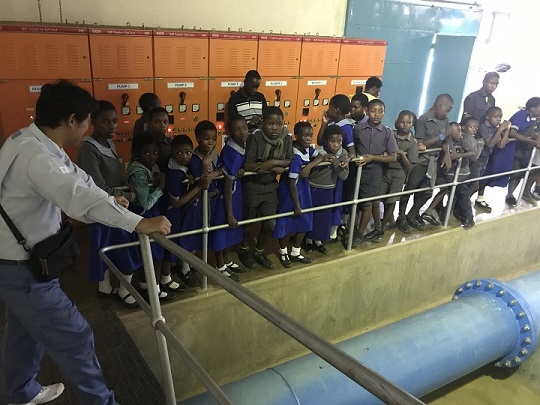
JICA expert ITAYA Hidefumi (far left) explains the water supply system to elementary school students at the Lilongwe Water Board Treatment Works. Water conservation efforts are making progress in Malawi
(Note) A watershed forest is a forest that is managed with a focus on water resource management functions (the capability of the soil to slowly retain water)
“Non-revenue water (NRW) refers to the supply of water that is unbilled as a result of water leakage or theft from the distribution pipes. Currently, about 40% of the water produced by the water treatment plant in Lilongwe is unbilled due to this," says ITAYA Hidefumi, a JICA expert who is working to strengthen the capacity of the Lilongwe Water Board (LWB) to address NRW. With 20 years’ experience working for the Yokohama City Waterworks Bureau in Japan, he is a specialist in the field.
Mr. Itaya, who was dispatched to Malawi in June 2019, is the chief advisor for the Project for Strengthening the Capacity of Non-Revenue Water Reduction for Lilongwe Water Board. In addition to developing plans to reduce NRW, he is involved with Lilongwe Water Board (LWB) staff in installing underground leak detectors and upgrading water distribution pipes. Due to the impact of COVID-19, he was forced to temporarily return to Japan in March 2020 but was reassigned in May 2021 and has since resumed his local cooperation activities.
“It is said that the lower the ratio of NRW, the better the management of the water supply. LWB has also set a goal to reduce the NRW ratio to 28% by 2025. The current NRW rate in Yokohama City is 7-8%, but 70 to 80 years ago, the NRW ratio was similar to that of Lilongwe City today. Over the decades, Japanese local governments have been able to reduce the NRW ratio. I feel that the knowledge built up by local governments in Japan can be utilized for technical guidance and recommendations in developing countries,” he says with conviction.
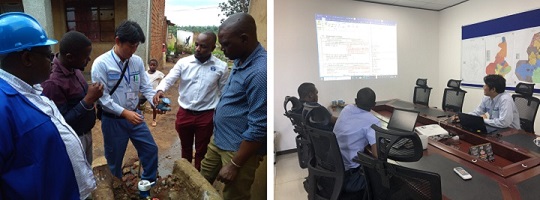
Installation of a water meter (left) and revising the NRW reduction plan (right). JICA is cooperating in improving the capacity of LWB by leveraging Japan's expertise in the water supply management
The creation of sustainable water supply systems is not limited to urban water supply, such as the installation of distribution pipes and measures against water leakage and theft. Nearly all of Lilongwe's water comes from the Dzalanyama Forest Reserve. In other words, to secure a reliable water supply, the preservation of the Dzalanyama Forest Reserve is a necessity.
However, the Dzalanyama Forest Reserve, a watershed forest, has been deforested and degraded due to illegal logging for the production of firewood and charcoal. With Malawi's efforts, supported by JICA, to establish a reliable and sustainable conservation and management system in this forest reserve area, both forest conservation (water source areas) and water supply projects (urban areas) to ensure the safe delivery of water to the local residents are the scope of assistance.
Explaining the significance of linkage between water supply and environmental conservation, Mr. Itaya says, “Water generated in the watershed forest is converted into water for daily use via water purification plants, and water resources are limited. Communicating these facts to local residents is vital. I believe that efforts to convey the importance of preserving the environment for the water we use are extremely important. We can do this by explaining the ‘water cycle’ through the introduction of various facilities related to water supply projects.”
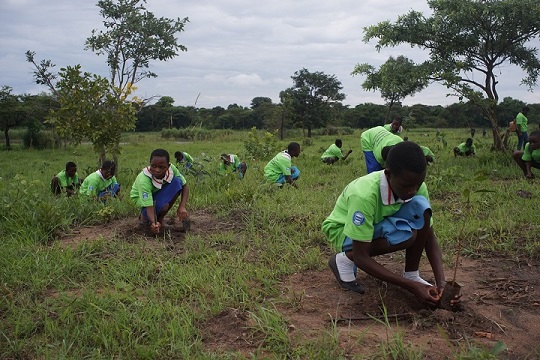
A tree-planting festival was held in the watershed forest area and local elementary school students experienced planting
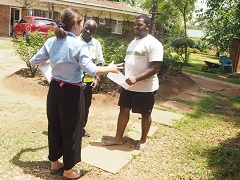
Ms. Yoshinaga (facing away) visits water users’ homes to discuss awareness of water supply usage
In conveying the importance of water to local residents, one person who played a significant role is YOSHINAGA Saki, who worked in Malawi as a Japan Overseas Cooperation Volunteer (JOCV) from January 2018 to March 2020. Ms. Yoshinaga, who works in the Forestry Bureau of the Shizuoka Prefectural Government, has experience not only in forest conservation but also in organizing events to convey the importance of protecting forests in collaboration with forestation volunteer groups in Japan. Utilizing this know-how, she has been involved in watershed conservation activities at the Dzalanyama Forest Reserve, and has also provided environmental education at elementary schools in the city to convey the importance of water.
Ms. Yoshinaga says, "We were visiting the households of water users directly to promote and educate them about water conservation.” She recalls how, just as she was studying a survey activity to see if it would be possible to detect leaks in the premises of each household and take measures against them using the leak detectors introduced by Mr. Itaya, she was forced to return to Japan due to the impact of COVID-19 in March of this year.
Commenting on the activities of Ms. Yoshinaga and others, Mr. Itaya says, “Ms. Yoshinaga reported to us about the water usage in each area and the stories heard from the local residents. This helped us conduct our activities with an overall understanding of the water supply situation in Lilongwe City, which is difficult to comprehend with merely information from within the Water Board.” He noted that although the experts and the JOCV had different positions and approaches, we were able to share information in order to progress toward the same goal.
In addition, as part of environmental education, Ms. Yoshinaga organized tours for elementary school students to observe the key points of their water supply resources. There, specialists like Mr. Itaya and other people concerned collaborated to explain the importance of conservation to the children. “Through listening to the specialists’ talk at the tour site, the students learned that the water for their households comes from the watershed forests. They also came to understand that their own water is in danger if they do not protect the watershed forests that are diminishing and are being degraded due to illegal logging. We were able to teach the children that all residents need to take good care of water, from the conservation of the watershed forests upstream to their homes downstream,” commented Ms. Yoshinaga.
Through the activities of the water supply project, the forest conservation project, and JOCV’s grass-root level activities, “joint efforts to protect water resources as a whole,” from water source forests to households, are being realized in Malawi.
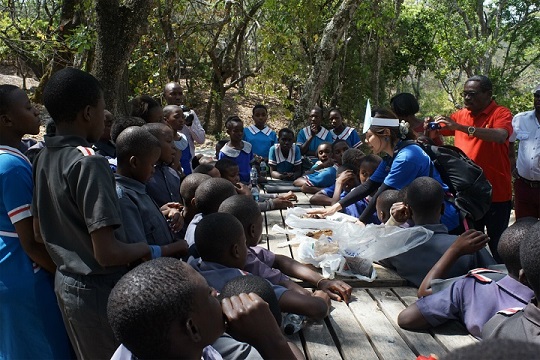
Ms. Yoshinaga (center right) explains to children during a tour of the watershed forest. Environmental education was conducted at five schools in the city, and teachers and parents voiced their desire for the program to continue
scroll